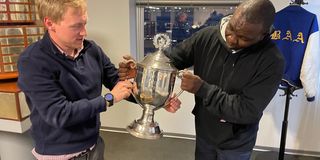Boston Marathon to Kenyan stars: Thank you for your dominance

Kenya-born Boston resident Douglas Maina and the Boston Athletic Association (BAA) communications manager Chris Lotsbom admire the trophy handed annually to winners of the Boston Marathon at the BAA offices in Boston on on November 11, 2021.
What you need to know:
- Veteran organiser ranks Hussein’s achievements and Mutai’s record as highlights of world’s oldest marathon
- Legendary Hussein was first African winner in 1988; the three-time champion launched an era of supremacy by East African runners
In Boston
Last weekend, Ibrahim Hussein was in New York for his induction into the New York City Marathon’s Hall of Fame having been the first African to win the “Big Apple” race in 1987.
Two states away in Massachusetts, organisers of the Boston Marathon, the world’s oldest marathon at 125 years, also paid tribute to Hussein who in 1988 also became the race’s first African winner.
Hussein made the Boston breakthrough with a winning time of two hours, eight minutes and 43 seconds, opening the way for 27 African wins, including two more by himself in 1991 and 1992.

Boston Athletic Association (BAA) Chief Operating Officer Jack Fleming during the interview at the BAA offices in Boston on November 11, 2021 with the backdrop of Kenya's Ibrahim Hussein winning the 1992 Boston Marathon.
At the 185 Dartmouth Street, sixth floor offices of the Boston Athletic Association (BAA), organisers of the Boston Marathon, Hussein’s achievements are etched in timeless preserve.
He is credited with having launched the “era of dominance” by East African athletes after having edged Tanzania’s Juma Ikangaa to win the epic 1988 battle by just one second.
After four individual victories by Robert “Mwafrika” Cheruiyot (2003, 2006, 2007, 2008), a hat-trick by Cosmas Ndeti (1993-1995) and a Moses Tanui double in 1996 and 1998, the dominance was raised to another level by another Kenyan, Geoffrey Mutai, who was chased down the race’s Boylston Street home stretch by compatriot Moses Mosop to an amazing 2:03:02 course record in 2011.
Ten years later, it remains the fastest marathon ever run on US soil.
In the women’s division, Ethiopian Fatuma Roba’s hat-trick (1997-99) opened the floodgates for Africa with Catherine “The Great” Ndereba grabbing four victories (2000, 2001, 2004, 2005) with compatriot Margaret Okayo (2002) and Russia’s Svetlana Zakharova (2003) breaking Ndereba’s rhythm.
Last month, it was another Kenyan double win here with Benson Kipruto (2:09:51) and Diana Chemtai Kipyogei (2:24:45) the elite men’s and women’s winners.
Such Kenyan dominance is not lost on race organisers with BAA’s Chief Operating Officer Jack Fleming on Thursday night paying glowing tribute to the contribution of Kenyan athletes to the race’s rich history.
“Kenya’s legacy here in Boston is unrivalled,” he told Nation Sport in an exclusive interview at the BAA offices.
“The earliest champion Ibrahim Hussein in 1988 - who came back and won two additional times - set the stage for a long and great string of runners that continues to this day.
“We are so proud to host so many Kenyans every year, not only at the marathons, but also at other events as well – like the five-kilometre, 10-kilometre races, the half marathon. Whenever we open up a race, we always know we are gonna have a very strong Kenyan field.”

The running singlet and bib worn by Kenya's Diana Kipyogei whe she won the Boston Marathon on her debut last month is displayed in the Boston Athletic Association offices in Boston. Below is the green tracksuit donated to Boston Athletic Association by the race's 2011 course record winner Geoffrey Mutai.
Fleming, a veteran in organising the Boston Marathon, ranks Hussein’s achievements along with Geoffrey Mutai’s 2011 course record as his highlights of the Boston race.
He recalled Hussein’s 1993 gesture when the Kenyan legend went back to the finish line, hours after completing the race, to wait for 1935/1945 champion and local BAA hero John Kelley finish what was one of his final marathons.
“That really showed Ibrahim’s character, that of such a gentleman, wanting to be there for someone else.
“I also think immediately of Geoffrey Mutai’s 2011 run, seeing the clock (2:03:02) and almost not believing that the clock was accurate because we hadn’t seen that time in Boston before!
“For Geoffrey to win in Boston and come back to win a super fast 10km road race a couple of months later to help us launch our new event at that time, it really stands out in my mind.”
Besides the champions, Fleming was particularly proud to have seen the progress of Kenya’s Mary Wacera Ngugi whose biggest World Marathon Majors breakthrough finally came last month when she crossed the line third (2:25:20) on the race’s iconic Boylston Street finish line.
Ngugi had competed in all BAA distance events from the 5km to half marathon before making her first podium last month.
“It’s almost her second home here now… Those folks who come back to Boston year after year almost become family and we love to not just talk about running, but their families too.
“It’s an honour to host the world, and especially Kenya,” Fleming adds.
The inaugural Boston Marathon was run on April 19, 1897, with 15 starters and 10 finishers.
The marathon has celebrated several landmarks over its rich, 125-year history, including the first time for a woman to compete and finish in 1966 when Bobbi Gibb dashed from the bush to start the race in Hopkington against the rules that barred women from the race.
In 1975, Bob Hall became the first competitor to complete the Boston Marathon in a wheelchair, finishing in 2:58:00 to see the Boston Marathon become the first marathon to feature a wheelchair division.
Tragedy struck the race in 2013 when two explosions went off on the final stretch on Boylston Street with five lives lost in the Boston attacks.
“Boston strong” subsequently became the rallying call for the race’s resilience against adversity.





